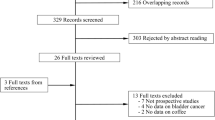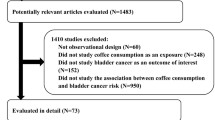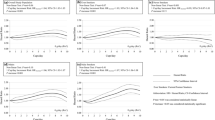Abstract
Objectives
Controversial results were reported among several epidemiologic studies on the relationship between coffee consumption and urologic cancer risk. We, therefore, conducted this meta-analysis to clarify these associations.
Methods
Electronic databases including Pubmed, Embase and Cochrane library were searched between January 1966 and August 2013 for eligible studies. Pooled relative risk (RR) and its 95 % confidence interval (CI) were calculated. All P values are two tailed.
Results
Thirteen cohorts were eligible for inclusion. As to prostate cancer (PCa), significant reverse association was found among highest versus none/lowest analysis with acceptable heterogeneity (RR 0.86, 95 % CI 0.79–0.95; I 2 25 %, P value for heterogeneity: 0.221). A pooled RR which assessed advanced PCa was 0.73 (with 95 % CI 0.50–1.07), and a slight stronger reverse association was found in fatal PCa. However, a slight insignificant reverse association, basing on 8 studies with 9 outcomes, was found in dose–response analysis (RR 0.98, 95 % CI 0.93–1.03). For kidney and bladder cancer, insignificant associations were found in both highest versus none/lowest analyses and dose–response analyses.
Conclusions
Our findings suggest that coffee consumption may reduce the risk of PCa. No associations were found with both bladder and kidney cancer. Further well-designed large-scaled cohort studies are warranted to provide more definitive conclusions.



Similar content being viewed by others
References
Jacobsen BK, Bjelke E, Kvale G, Heuch I (1986) Coffee drinking, mortality, and cancer incidence: results from a Norwegian prospective study. J Natl Cancer Inst 76:823–831
Stensvold I, Jacobsen BK (1994) Coffee and cancer: a prospective study of 43,000 Norwegian men and women. Cancer Causes Control 5:401–408
Ozasa K, Nakao M, Watanabe Y et al (2005) Association of serum phytoestrogen concentration and dietary habits in a sample set of the JACC Study. J Epidemiol 15(Suppl 2):S196–S202
Nomura AM, Kolonel LN, Hankin JH, Yoshizawa CN (1991) Dietary factors in cancer of the lower urinary tract. Int J Cancer 10(48):199–205
Severson RK, Nomura AM, Grove JS, Stemmermann GN (1989) A prospective study of demographics, diet, and prostate cancer among men of Japanese ancestry in Hawaii. Cancer Res 1(49):1857–1860
Ellison LF (2000) Tea and other beverage consumption and prostate cancer risk: a Canadian retrospective cohort study. Eur J Cancer Prev 9:125–130
Mills PK, Beeson WL, Phillips RL, Fraser GE (1991) Bladder cancer in a low risk population: results from the Adventist Health Study. Am J Epidemiol 1(133):230–239
Michaud DS, Spiegelman D, Clinton SK et al (1999) Fluid intake and the risk of bladder cancer in men. N Engl J Med 6(340):1390–1397
Nagano J, Kono S, Preston DL et al (2000) Bladder-cancer incidence in relation to vegetable and fruit consumption: a prospective study of atomic-bomb survivors. Int J Cancer 1(86):132–138
Park CH, Myung SK, Kim TY, Seo HG, Jeon YJ, Kim Y (2010) Coffee consumption and risk of prostate cancer: a meta-analysis of epidemiological studies. BJU Int. 106:762–769
Zhou Y, Tian C, Jia C (2012) A dose-response meta-analysis of coffee consumption and bladder cancer. Prev Med 55:14–22
Discacciati A, Orsini N, Andersson SO et al (2013) Coffee consumption and risk of localized, advanced and fatal prostate cancer: a population-based prospective study. Ann Oncol 24:1912–1918
Bosire C, Stampfer MJ, Subar AF, Wilson KM, Park Y, Sinha R (2013) Coffee consumption and the risk of overall and fatal prostate cancer in the NIH-AARP Diet and Health Study. Cancer Causes Control 24:1527–1534
Li Q, Kakizaki M, Sugawara Y et al (2013) Coffee consumption and the risk of prostate cancer: the Ohsaki Cohort Study. Br J Cancer 11(108):2381–2389
Moher D, Liberati A, Tetzlaff J, Altman DG (2010) Preferred reporting items for systematic reviews and meta-analyses: the PRISMA statement. Int J Surg. 8:336–341
Stroup DF, Berlin JA, Morton SC et al (2000) Meta-analysis of observational studies in epidemiology: a proposal for reporting. Meta-analysis of observational studies in epidemiology (MOOSE) group. JAMA 19(283):2008–2012
Kurahashi N, Inoue M, Iwasaki M, Sasazuki S, Tsugane S (2009) Coffee, green tea, and caffeine consumption and subsequent risk of bladder cancer in relation to smoking status: a prospective study in Japan. Cancer Sci 100:294–914
Shafique K, McLoone P, Qureshi K, Leung H, Hart C, Morrison DS (2012) Coffee consumption and prostate cancer risk: further evidence for inverse relationship. Nutr J 11:42
Washio M, Mori M, Sakauchi F et al (2005) Risk factors for kidney cancer in a Japanese population: findings from the JACC Study. J Epidemiol. 15(Suppl 2):S203–S211
Wilson KM, Kasperzyk JL, Rider JR et al (2011) Coffee consumption and prostate cancer risk and progression in the health professionals follow-up study. J Natl Cancer Inst 8(103):876–884
Lee JE, Giovannucci E, Smith-Warner SA, Spiegelman D, Willett WC, Curhan GC (2006) Total fluid intake and use of individual beverages and risk of renal cell cancer in two large cohorts. Cancer Epidemiol Biomarkers Prev. 15:1204–1211
Zeegers MP, Dorant E, Goldbohm RA, van den Brandt PA (2001) Are coffee, tea, and total fluid consumption associated with bladder cancer risk? Results from the Netherlands cohort study. Cancer Causes Control 12:231–238
Moskal A, Norat T, Ferrari P, Riboli E (2007) Alcohol intake and colorectal cancer risk: a dose-response meta-analysis of published cohort studies. Int J Cancer 1(120):664–671
Aune D, Greenwood DC, Chan DS et al (2012) Body mass index, abdominal fatness and pancreatic cancer risk: a systematic review and non-linear dose-response meta-analysis of prospective studies. Ann Oncol 23:843–852
Bhathena SJ, Velasquez MT (2002) Beneficial role of dietary phytoestrogens in obesity and diabetes. Am J Clin Nutr 76:1191–1201
Wu T, Willett WC, Hankinson SE, Giovannucci E (2005) Caffeinated coffee, decaffeinated coffee, and caffeine in relation to plasma C-peptide levels, a marker of insulin secretion, in US women. Diabetes Care 28:1390–1396
Russnes KM, Wilson KM, Epstein MM, et al. Total antioxidant intake in relation to prostate cancer incidence in the health professionals follow up study. Int J Cancer. 2013
Platz EA, Giovannucci E (2004) The epidemiology of sex steroid hormones and their signaling and metabolic pathways in the etiology of prostate cancer. J Steroid Biochem Mol Biol 92:237–253
Kotsopoulos J, Eliassen AH, Missmer SA, Hankinson SE, Tworoger SS (2009) Relationship between caffeine intake and plasma sex hormone concentrations in premenopausal and postmenopausal women. Cancer 15(115):2765–2774
Safarinejad MR (2011) Insulin-like growth factor binding protein-3 (IGFBP-3) gene variants are associated with renal cell carcinoma. BJU Int. 108:762–770
Bracken MB, Triche E, Grosso L, Hellenbrand K, Belanger K, Leaderer BP (2002) Heterogeneity in assessing self-reports of caffeine exposure: implications for studies of health effects. Epidemiology 13:165–171
Acknowledgments
Tian-bao Huang was responsible for the initial plan, data collection, statistical analysis and for conducting the study. Tian-bao Huang, Yang Yan and Zhui-feng Guo contributed to data collection, data extraction, data interpretation and manuscript drafting. Huan Liu, Xiao-long Zhang, Jiang Geng and Xu-dong Yao contributed to data interpretation and study design. Jun-hua Zheng was the guarantor for this paper and has full responsibility for this study.
Conflict of interest
None.
Author information
Authors and Affiliations
Corresponding author
Additional information
Tian-bao Huang and Zhui-feng Guo have contributed equally to this work.
Rights and permissions
About this article
Cite this article
Huang, Tb., Guo, Zf., Zhang, Xl. et al. Coffee consumption and urologic cancer risk: a meta-analysis of cohort studies. Int Urol Nephrol 46, 1481–1493 (2014). https://doi.org/10.1007/s11255-014-0699-9
Received:
Accepted:
Published:
Issue Date:
DOI: https://doi.org/10.1007/s11255-014-0699-9




